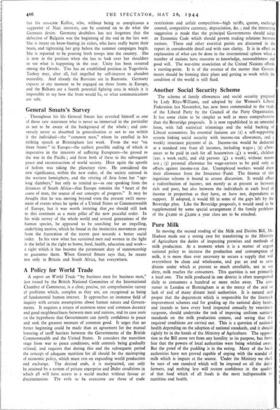General Smuts's Survey
. Throughout his life General Smuts has revealed himself as one of those rare statesmen who is never so immersed in the particular as not to be aware of the background of the whole ; and con- versely never so absorbed in generalisation as not to see within it the individual—the " common man," whom he extolled in his striking speech at Birmingham last week. From the war "on three fronts " in Europe—the earliest possible ending of which is imperative in the interests of suffering Europeans—he passed to the war in the Pacific ; and from both of these to the subsequent peace and reconstruction of world society. Here again the apostle of holism was taking the planetary view. He considered the new significance, within the new order, of the society centred in the western hemisphere, and the stirring of Asia from her " age- long slumbers," but only to remind us—as one speaking from the distances of *South Africa—that Europe remains the `f heart of the cause of man, the source of our concepts of progress." It may be thought that he was moving beyond even the present swift move- ment of events when he spoke of a United States or Commonwealth of Europe, but it was worth insisting that ,we should still look to this continent as a main pillar of the new peaceful order. In his wide survey of the whole world and several generations of the human species, he appeared to be searching for an impelling, underlying motive, which he found in the instinctive movement away from the frustration of the recent past towards a better social order. In his view what has sustained men and women in the fight is the belief in the right to home, food, health, education and work— a right which it has become the paramount duty of statesmanship to guarantee them. When General Smuts says that, he means not only in Britain and South Africa, but 'everywhere.


























 Previous page
Previous page